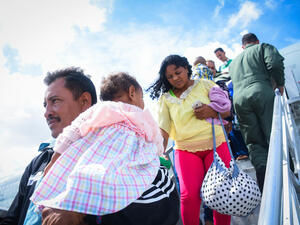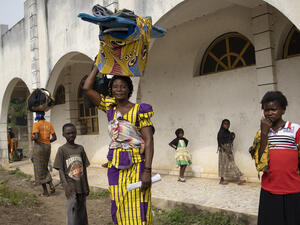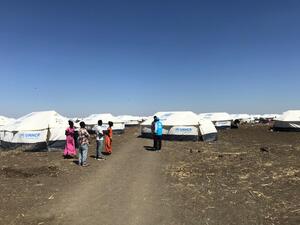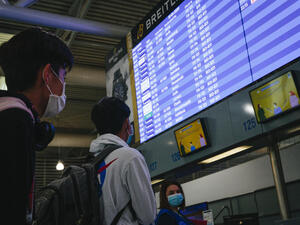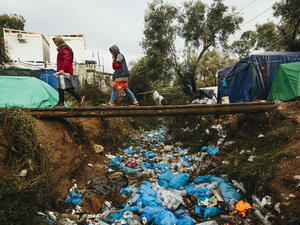Sudanese refugees could move to inland Chad by weekend
Sudanese refugees could move to inland Chad by weekend

Sudanese refugees languishing in a makeshift site in the Chadian border town of Tine.
ABECHE, Chad, Jan 13 (UNHCR) - Thousands of Sudanese refugees living in precarious conditions on the Chad-Sudan border could be moved to safety as soon as this weekend as aid agencies finalise preparations at a new site further inland.
The UN refugee agency plans to start pre-registering the first groups of refugees on Thursday in anticipation of the move to the site at Farchana in eastern Chad, 55 km from the border with western Sudan.
UNHCR and its partner, Gesellschaft für Technische Zusammenarbeit (GTZ), are readying the new camp to receive the first groups of refugees by the end of this week. Aid workers are erecting 25 large tents every day and transporting water from three wells at a nearby village to be stored in water bladders at the camp for use by the refugees.
The agencies plan to drill wells directly at the site in the near future to provide water for all the refugees. The camp should be able to accommodate 2,000 people by the weekend, and up to 9,000 when it is fully expanded.
The relocation to Farchana is expected to take several weeks. Poor road conditions and logistical difficulties mean that the 70-km journey from border sites around Adré could take as long as three hours. In the beginning, only 300 people can be moved every few days, with daily convoys starting once the operation gets fully underway.
Upon arrival at the camp, the refugees will be registered and assigned a tent, before going through medical screening and vaccinations carried out by a team from MSF-Holland. The refugees will also receive a food package provided by the World Food Programme with enough sorghum, corn flour and oil for 15 days. UNHCR will distribute blankets, mattresses, mosquito nets, kitchen sets, soap and jerry cans to the refugees.
The upcoming move will be a welcome change for some of the estimated 95,000 Sudanese refugees who have fled fighting in western Sudan's Darfur region for eastern Chad since April last year. Many of them have settled in makeshift sites along the border, living in poor conditions and subject to periodic cross-border incursions by militia in Sudan.
The search for more new sites is still ongoing as UNHCR and other aid agencies continue regular aid distributions to the refugees still waiting along the remote and insecure border.
For security reasons, potential camps must be located at least 50 km from the border. The sites must also have sufficient water supplies for the refugees and adequate surrounding land to allow them to grow grain and feed their cattle.
In addition to Farchana, UNHCR and the Chadian authorities have identified two other sites that meet these criteria. Both sites are located to the north of Farchana: Saranh, in the Iriba area, will have a capacity of up to 20,000 people; and Kounoungo, near Guéréda, could host 8,000 people. A Chadian hydro-geologist team is expected to assess new potential sites in the coming days.





